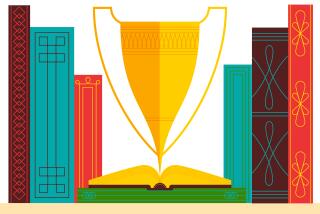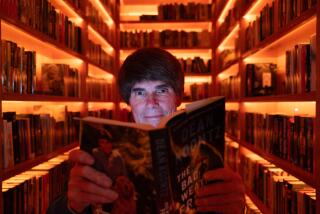The art of liberation
At home in China, every element of Nan and Pingping’s existence was dictated by the government, including Nan’s college courses. Sent to the United States to attend graduate school, he has been slogging his way toward a PhD in political science at Brandeis University. Nan and Pingping had to leave Taotao, their young son, behind, and now, four years later, the family is reunited. It happens just in time for Nan, an aspiring poet, to quit school and sever his connection to Beijing in protest against the 1989 massacre in Tiananmen Square: “He was free, free to choose his own way and to make something of himself. But what were the choices available for him? Could he survive in this land? The feeling of uncertainty overwhelmed him.”
Ha Jin’s characters in “A Free Life” face all the daunting hardships that so many immigrants grapple with: the struggle to learn a new language and new social customs; the anguish of having to accept mindless, low-paying jobs despite being well educated; isolation, prejudice and discrimination. But the Wu family is also burdened with personal sorrows. Obsessed with an ex-girlfriend, Nan does not love his wife and she knows it. He also yearns for the freedom to devote himself to writing poetry, his true vocation. Pingping has endured myriad disappointments, including being refused to study medicine in China, and valiantly loves her husband, even though he is cold to her. What unites them is their determination to make a better life for their son, whatever the cost.
“A Free Life” is the first of Jin’s novels to take place in America, but it is of a piece with his previous works, each a compelling and illuminating study in confinement, both literal and psychological. In “War Trash,” the narrator looks back on his internment during the Korean War in an American POW camp. In “The Crazed,” as the protest on Tiananmen Square reaches critical mass, a literary grad student is holed up in a shabby hospital room with his stroke-afflicted mentor who is assailed by memories of his incarceration in a hard labor camp. In “Waiting,” a National Book Award winner, Lin Kong is trapped in a moribund marriage and in love with another woman. Now, with “A Free Life,” Jin’s protagonist is imprisoned in a cage of longing, fear and guilt.
After working as a night watchman and security guard, Nan decides that he must become self-sufficient, so he goes to work in a Chinese restaurant, intending to become a chef. Frugal and focused, the Wus manage to purchase the Gold Wok, a modest establishment in a mall outside Atlanta. The work is exhausting, the days are endless, encounters with strangers and new acquaintances are often fraught, conflicts are wounding, yet through it all, family bonds are strengthened. Pingping emerges as a tough and capable woman of keen intelligence and forbearance, and Nan’s respect for her grows.
Writing in exquisite and resonant detail, Jin has fashioned a ruminative, capacious, covertly ironic and quietly revealing tale of one family’s pursuit of the American Dream, and one artist’s struggle to free himself from the shackles of pragmatism. So intense and exacting is the anatomy of his protagonist’s pursuit of personal and artistic liberty that one can’t help but assume that it is infused with autobiography. Indeed, Jin, a poet as well as a fiction writer, left China in 1985 to attend Brandeis University, and in 1990 he vowed to speak and write strictly in English. In this novel of an immigrant writer tormented by the question of whether he can or should write in English, language is not only the medium but to some extent also the message.
Pingping acquires English “mainly by osmosis.” Her pronunciation is good but her grammar is sketchy, and she often gets idiomatic expressions wrong, causing Americanized Taotao much embarrassment. The novel’s most amusing incidents revolve around linguistic misunderstandings. In order to convey the difficulties and discomforts of acquiring a second language, Jin uses italics to indicate when characters are speaking Chinese and, for Nan’s English, a phonetic dialect to give readers a sense of how he sounds to Americans. Here’s Nan, who is always blunt, telling a prospective employer: “The troos is that no matter how hard I work, I can never be more zan a social security nahmber.” Later he asks a black co-worker, “Is a Chinese also cahlored?” Nan studies the dictionary every chance he gets: “He knew that in this land the language was like a body of water in which he had to learn to swim and breathe, even though he’d feel out of his element whenever he used it. If he didn’t try hard to adapt himself, developing new ‘lungs and gills’ for this alien water, his life would be confined and atrophied, and eventually wither away.”
Every conversation, transaction and confrontation exposes differences in perception between the Wus and the Americans they meet. Nan and Pingping become friends with a white couple who adopt a Chinese daughter, raising provocative questions about culture, race and family. Nan gets into arguments with other Chinese immigrants about religion and patriotism, and his often humorous interactions with Chinese and American writers offer a subtle critique of the literary world’s cliques, politics and contradictory ambitions for aesthetic integrity and marketplace success.
Nature itself reflects human paradoxes. The Wus buy a house on a small lake that is home to a flock of Canada geese. Nan is disgusted when he realizes that because his neighbors feed them, the geese have “grown fat, lazy, and comfortable, no longer possessed of the instinct for migration . . . . Just for easy food, the geese had chosen to live a riskless, stranded life.” Later, Pingping saves a duck entangled in a fishing line, the hook piercing its tongue. The wounded drake serves as a striking symbol of the Wus’ financial constraints and difficulty in communicating; it is also a haunting emblem of humankind’s capacity for both careless destruction and, thanks to Pingping’s ministrations, succor.
A master of the internal monologue, Jin is acutely attuned to the psychic damage wrought by China’s savagely oppressive regime. As a woman from Shanghai tells Nan: “Freedom is meaningless if you don’t know how to use it. We’ve been oppressed and confined so long that it’s hard for us to change our mind-set and achieve real freedom. . . . It’s more difficult to break the self-imposed tyranny than the external constraints.” This is the task Nan undertakes.
Jin’s long, episodic novel can, in spite of his exceptional skill and clear vision, feel weighed down with minutiae and analysis. But the chapters are short, vivid and brimming with feeling, and the moment-by-moment pace makes visceral the toil and anxiety of Nan and Pingping’s disciplined lives. The gradual accumulation of experiences and realizations is mesmerizing and enlightening.
Ultimately, Ha Jin’s deeply felt, encompassing and slowly percolating novel of one man’s evolution and emancipation is a meditation on what makes a free life, and on why honesty and art matter. During his trial by fire as husband, father, restaurateur and poet in a strange land, Nan rejects the notion that self-sacrifice is noble and refutes the myth that art is forged in hardship. Creativity, he asserts, is starved, stunted and finally smothered by prolonged suffering. For decency, love and art to thrive, there must be serenity and freedom. Nan feels “that a good life should be uneventful, having few dramatic moments; instead, it should be filled with small delights, each of which should be appreciated and enjoyed like a gift.”
And, whenever possible, transmuted into poetry.
More to Read
Sign up for our Book Club newsletter
Get the latest news, events and more from the Los Angeles Times Book Club, and help us get L.A. reading and talking.
You may occasionally receive promotional content from the Los Angeles Times.






